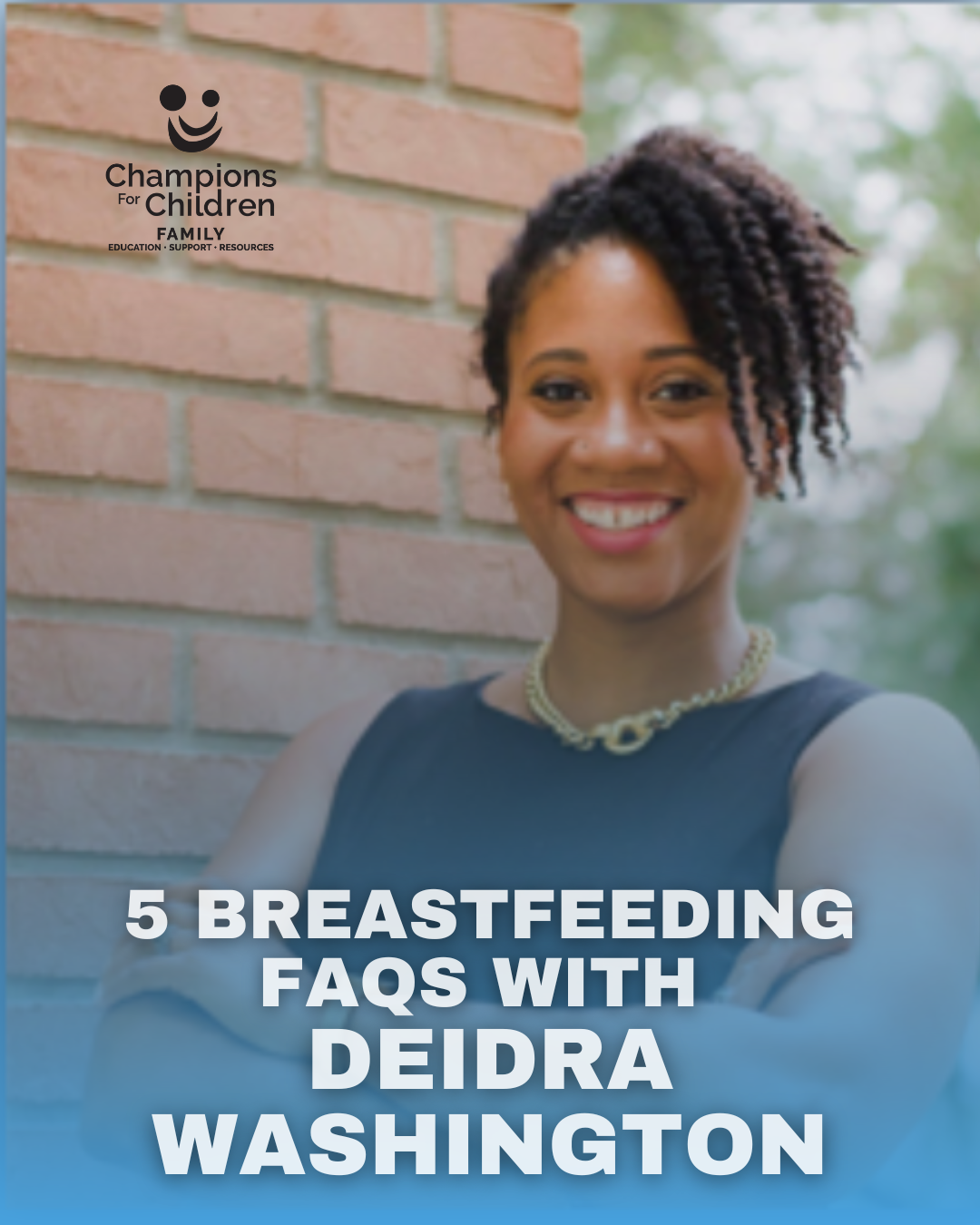5 Breastfeeding FAQs
with Deidra Washington, IBCLC

August is National Breastfeeding Awareness month! This month allows us to shine a light on the importance of breastfeeding for babies and moms alike. Breastfeeding is a learned activity. Most new parents need guidance and support when beginning and sometimes throughout their breastfeeding journey. Having the expertise of an International Board Certified Lactation Consultant (IBCLC) can really help a family meet their breastfeeding goals. At Champions for Children, our unique abcProgram offers the only completely no-cost, universal access breastfeeding support program in Hillsborough County.
This week, we sat down with Deidra Washington, an IBCLC from our abcProgram, to answer some of the common questions parents have regarding breastfeeding and how a certified lactation consultant can help. Deira has 10 years of experience providing nutrition and breastfeeding support to families in Hillsborough County.
Let’s Dive in!
Q: How can moms know if their baby is getting a sufficient amount of breast milk?
As a lactation consultant, the number 1 concern that I hear from breastfeeding moms and parents is “Is my baby getting enough?” There are 4 easy ways that can help you gauge if your baby is getting enough milk. Poop, pee, weight gain, and feeding frequency. After about day 5 an exclusively breastfed baby will have about 4-5 yellow-colored poop diapers and you can expect a wet diaper each time you feed the baby.
After 2 weeks, a baby should gain about an ounce per day on average or 7 ounces per week. And lastly, babies younger than 3 months old should be eating 8-12 or more times a day. It is good to keep in mind there are different degrees of what is normal, and each day can vary. If you are worried, stay in contact with a lactation professional to ensure all is well and your baby is in fact getting enough milk.
Q: Some moms are afraid to breastfeed because they heard it can be painful. Are there any tips or techniques that can ensure less pain in the beginning?
Sure! Effective breastfeeding should not hurt! The key is having the right positioning and helping the baby approach the breast in the best possible way. Positioning the baby’s nose opposite the nipple helps the baby to achieve a wide gaping mouth. Think about how you would eat a huge burger. You would open your mouth really wide to ensure you can get all of the ingredients on that burger with each bite. Same with baby. He or she must tilt their head back to get a large amount of areolar tissue in the mouth. Holding baby tummy to tummy ensures the baby is facing the breast and can suckle and swallow effectively. Going back to that same burger…you would sit at the table facing your plate. It is not comfortable to have to twist your upper body to eat. If you tuck your chin down to your chest you cannot open your mouth wide or swallow well.
Q: When can a mom stop breastfeeding?
I want to ensure parents have full autonomy over their bodies and feel supported to stop breastfeeding when they feel the time is right. For some moms, making the decision to stop breastfeeding can be in the name of mental health or even their own physical health. The recommendations on breastfeeding according to the American Academy of Pediatrics (AAP) and the World Health Organization (WHO) says “exclusive breastfeeding for the first 6 months of life, then at introducing complementary foods (baby foods) at 6 months while continuing to breastfeed until at least 2 years”.
Q: At what point should a mother start pumping? Should mom pump before 4 weeks?
Pumping should be initiated when mom and baby are not able to breastfeed. This can be due to the baby or mom having medical problems, or the baby’s inability to latch. Mom should be supported if it is her goal to exclusively pump because she does not want to put her baby on the breast. In the first 3-5 days a better option to express milk would be to hand express. The first milk that is made, colostrum, is produced in very small amounts and pumping usually is not the best way to extract it. It can be ideal to have the breastfeeding dyad have close monitoring from a lactation professional to ensure everything is on track.
Q: Can a mom breastfeed with implants?
This is a great question, and the answer is yes. Breast implants are not a deal breaker when it comes to breastfeeding. Since the implant takes up space in the breast, some issues can arise with capacity as there is less space for the milk to accumulate. It is also important to consider how the surgery was performed. Breastfeeding is about breast and nipple stimulation and if nerves are damaged and mom does not have sensation in her nipples, this can create a problem with her supply. Mom should be supported and educated on frequent and adequate milk removal. Any breast surgery or even injuries would be important information to communicate to the lactation pro.
For more breastfeeding tips and information, check out our past blogs below!
How to be an Advocate for a Breastfeeding Mother
5 Tips for a Successful Breastfeeding Journey
It’s Black Breastfeeding Week! – Here’s why it’s important
Breastfeeding – Myth vs Fact
Lactation Consultants: A Breastfeeder’s Cheat Code
10 Q&As with Amy Bohler, Lactation Consultant
